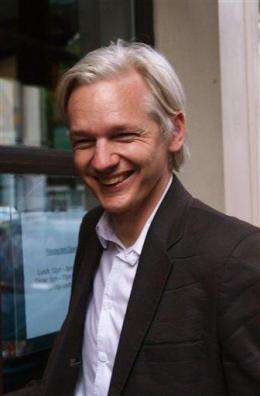WikiLeaks: We don't know source of leaked data

(AP) -- WikiLeaks' editor-in-chief claims his organization doesn't know who sent it some 91,000 secret U.S. military documents on the Afghan war, telling journalists the website was set up to hide the source of its data from those who receive it.
Julian Assange didn't say whether he meant he had no idea who leaked the documents or whether his organization simply could not be sure. But he did say the added layer of secrecy helped protect the site's sources from spy agencies and hostile corporations.
"We never know the source of the leak," he told journalists at London's Frontline Club late Tuesday. "Our whole system is designed such that we don't have to keep that secret."
U.S. officials said U.S. operatives inside Afghanistan and Pakistan may be in danger following the massive online disclosure Sunday.
In his first public comments, President Barack Obama said the leak of classified information from the battlefield "could potentially jeopardize individuals or operations."
The president spoke Tuesday in Washington after meeting with leaders of the House of Representatives and the Senate from both parties.
In Baghdad, Adm. Mike Mullen, chairman of the Joint Chiefs of Staff, told reporters he was "appalled" by the leak.
"There is a real potential threat there to put American lives at risk," he said.
In London, Assange spoke for nearly two-and-a-half hours, outlining his site's mission and methods, and defending it from criticisms that it had put lives at risk by putting mountains of classified information in the public domain.
While he acknowledged the site's anonymous submissions raised concerns about the authenticity of the material, he said WikiLeaks had yet to be fooled by a bogus document.
"We do see wholly fabricated submissions, usually around election time," he said, but added they were "quite rare."
Assange said WikiLeaks had ex-military and former intelligence workers "in our network," people who could help evaluate whether documents leaked from the armed forces or spy agencies were genuine.
The website's worse fear, he said, was not a complete forgery but a real document that had been subtly tampered with. Still, he said he had yet to see that happen.
U.S. Attorney General Eric Holder a Pentagon investigation will determine whether criminal charges will be filed in the leaking of the documents. Holder, speaking Wednesday during a visit to Egypt, said the Justice Department is working with the Pentagon-led investigation to determine the source of the leak.
In addition to the Taliban, the raw data may also prove useful to hostile intelligence services in countries such as China and Russia, who have the resources to process and make sense of such vast vaults of data, said Ellen McCarthy, former U.S. intelligence officer and president of the Intelligence and National Security Alliance.
Former CIA chief Michael Hayden added: "If I'm head of the Russian intelligence, I'm getting my best English speakers and saying: 'Read every document, and I want you to tell me, how good are these guys? What are their approaches, their strengths, their weaknesses and their blind spots?'"
Assange agreed the files offered insight into U.S. tactics. But he said that was nothing new for his Web site, noting that WikiLeaks already carries a copy of the U.S. Special Forces' 2006 manual for southern Afghanistan.
"We put out that stuff all the time," he said.
He seemed irritated when a member of the audience pressed him on whether there were ever any legitimate national security concerns that would prevent him from publishing a leaked document.
"It is not our role to play sides for states. States have national security concerns, we do not have national security concerns," he said.
"You often hear ... that something may be a threat to U.S. national security. This must be shot down, whenever this statement is made. A threat to U.S. national security? Is anyone serious? The security of the entire nation of the United States? It is ridiculous!" he declared.
But he admitted that individual cases were different.
"If we are talking a threat to individual soldiers ... or citizens of the United States, then that is potentially a genuine concern," he said.
---
Associated Press Writer Kimberly Dozier in Washington and Sarah El Deeb in Cairo contributed to this story.
---
Online:
WikiLeaks: http://wikileaks.org/
Frontline Club: http://frontlineclub.com/
©2010 The Associated Press. All rights reserved. This material may not be published, broadcast, rewritten or redistributed.





















